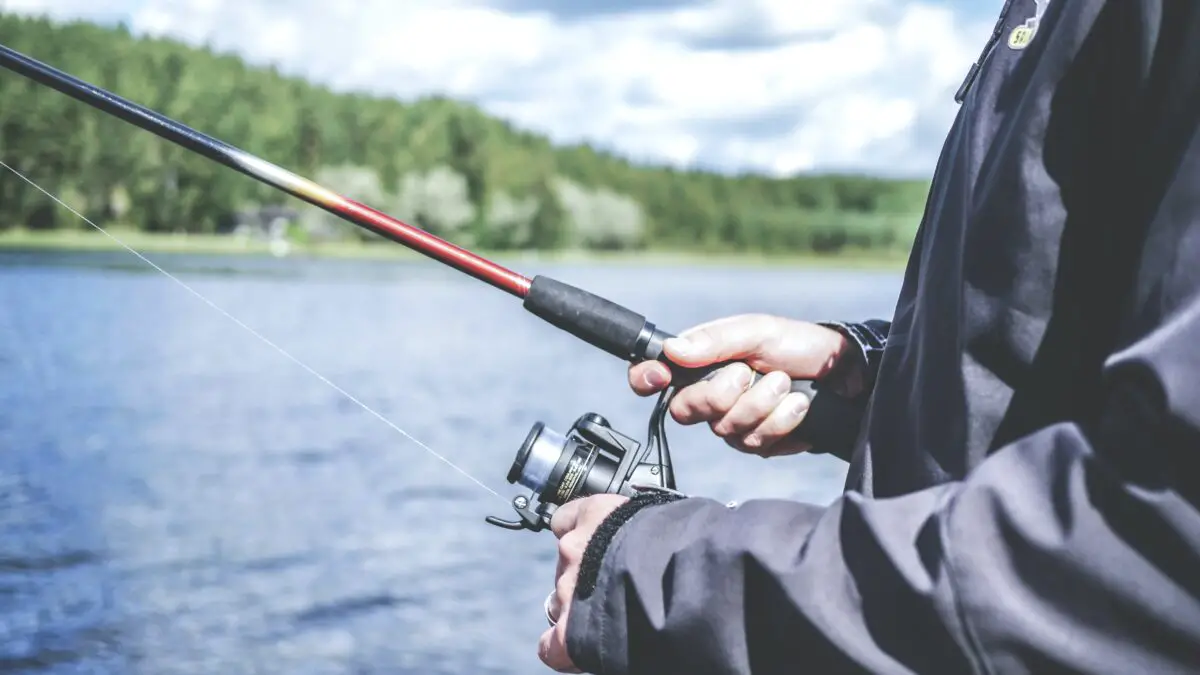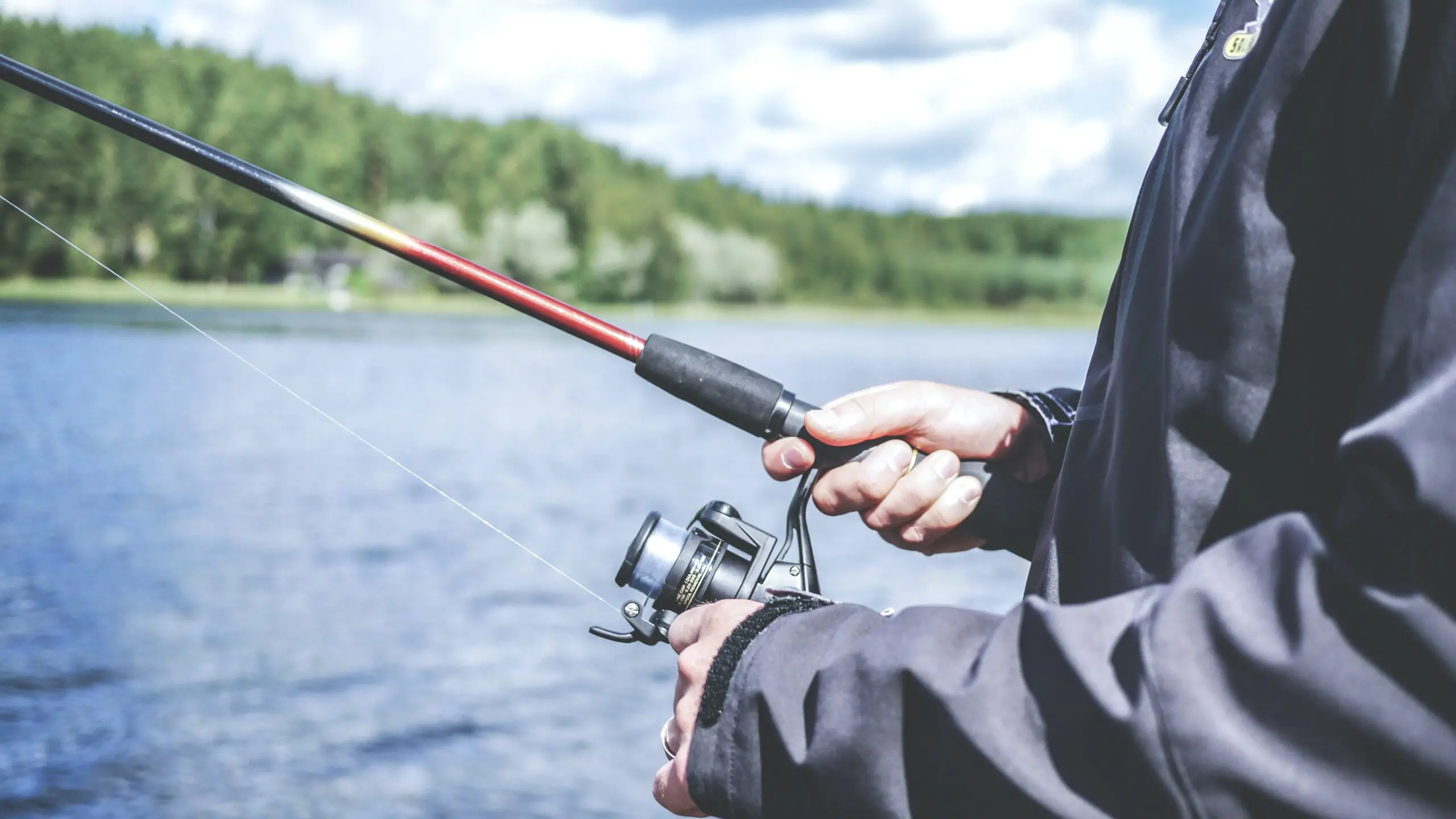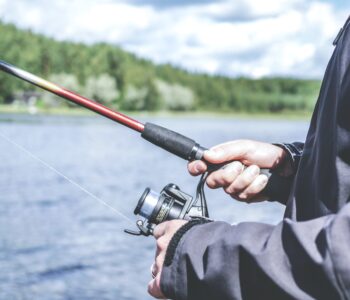You won’t believe how many fishing idioms there are in English! It just goes to show, we really do have idioms and expressions for every situation.
Here you will find a list of common fish idioms, as well as some more unusual ones. Each saying comes with a full definition and examples, so whether you’re learning some new vocabulary or just searching for inspiration, we hope this helps!

Fishing idioms
A big fish in a small pond
A lot of these fishing idioms are really interesting and thoughtful. When you talk about a person as being a big fish in a small pond, you are indicating that although they are dominant in their small circle, they are not well-known or important outside of that group.
“Take no notice of him, he’s just a big fish in a small pond.”
Hook, line, and sinker
This idiom is used in fishing when a fish not only swallows the bait and the hook, but also the ‘sinker’ weight and part of the line.
Figuratively, hook, line, and sinker is an adverbial phrase meaning ‘totally’ or ‘unquestioningly’. It is often used to emphasize how easily someone was tricked or deceived, but it can also refer to someone being very serious or committed to something.
“We told him the party was fancy dress and he fell for it hook, line and sinker!”
“When she gets her mind set on something, she commits to it hook, line and sinker.”
A fish out of water
This saying fits really well into this list of fishing idioms, although it could also be classed as a water idiom. When you remove a fish from its natural environment of water, it flaps around, acts awkwardly, panics, and is generally unhappy. This is why a person in a new or unsuitable situation is compared to a fish out of water.
“I feel like a fish out of water in this new company.”
Like a fish to water
Conversely, when you take to a new activity with ease and progress quickly and naturally, people will comment that you took to it like a fish to water. You may also hear people use ‘duck’ instead of fish.
“Mike took to ballet like a fish to water.”
This is a good example of an idiom about learning, but there are many others to discover.
Fish for compliments
A lot of people on social media could be accused of fishing for compliments. This happens when a person deliberately puts themselves down or says something negative about themselves in order to elicit compliments from others.
“Why would you post a stunning picture of yourself in full makeup and say you’re not pretty?! You’re clearly just fishing for compliments.”
Although this manipulative behavior does occur a lot on social media, it can happen in many real-life situations too.
A fishing expedition
A fishing expedition, in the idiomatic sense, is something that police officers or investigators do. It refers to an investigation carried out in the hope of uncovering useful or damaging information, but without any specific target for the search.
This often occurs in politics, with one politician hoping to uncover something they can use against a rival.
“Your honor, this line of questioning is simply a fishing expedition and nothing more.”
Of course, in a non-idiomatic sense, the phrase just refers to a fishing trip.
There are plenty more fish in the sea
This is an idiom that relates to relationships. When someone is upset about a romantic relationship ending, you can try to comfort them by saying there are plenty more fish in the sea. This means that although one particular relationship is over, there are many other potential partners out there for them to meet.
“Try not to cry. Just remember there are plenty more fish in the sea.”
Of course, when you are going through the heartbreak of a bad breakup, this may be the last thing you want to hear as you just want the relationship restored!
You can find some more positive sea and ocean idioms here.
Off the hook
There are a few meanings for this fishing idiom. Most commonly, off the hook means freed from an obligation or released from a difficult situation without negative consequences; just like a fish that wriggles itself off an angler’s hook.
“I thought I had to babysit my sister tonight, but Mum and Dad are back early so I’m off the hook.”
“Sandy’s teacher let her off the hook since it was the first time she’d been in trouble.”
This phrase is also a (slightly old-fashioned) slang term to say that something is amazing or enjoyable, such as a song or a party.
Finally, it relates to telephones – but the kind with a receiver and a cradle. When you leave a phone off the hook, you leave it out of its correct position on the cradle, which stops it from ringing when someone calls.
Open a can of worms
You might open a real can of worms as bait, but this is a fun fishing idiom to describe a potentially bad situation. When you open a can of worms, you say or do something that may cause more harm than good, or create more problems in a situation.
“Stacy opened a can of worms in this morning’s meeting when she mentioned the accounting errors.”
Reel someone/something in
When you reel in a fish, you are simply pulling them towards you, out of the water. And this is why, as a fishing idiom, when you reel someone in, you are attracting them to you or your business.
You can also reel something in, meaning you are attracting or collecting a lot of that thing (often money or sales). In both cases, this phrasal verb can be separable or inseparable.
“Come on guys, the sale is starting so let’s reel ’em in today.”
“Marvin always thinks he can reel the girls in with his dance moves.”
“I have a good feeling we’re going to start reeling in sales soon.”
The similar expression real it in means to make a lot of money or sales. This phrase is always separable.
“We’ve been working hard on this new range, now it’s time to reel it in.”
Reel off
Here’s another phrasal verb using ‘reel’. When you reel something off, you effortlessly name a list of things on a certain topic.
“I asked if there was anything I could help with, and he started reeling off a list of chores.”
“Tom can reel off all the players on his favorite football team.”
What’s that got to do with the price of fish?
Here’s one of the more British English idioms related to fish. This rhetorical question (a question that is not expected to be answered) is used in response to a comment or question that has no bearing on the current conversation.
When someone interjects with a question or comment that you feel is irrelevant or unrelated to the topic you’re discussing, you can cut them off by saying What’s that got to do with the price of fish?.
“What’s that got to do with the price of fish? We’re talking about plans for the weekend!”
Note that this is a light-hearted saying and shouldn’t be used in formal situations.
Red herring
A red herring is something that distracts people from the main thing that they should be focusing on. It is often put there intentionally, for this purpose.
“The police were following a red herring for a while, but they have caught the robber now.”
This is one of many idioms with colors in English.
You need to bait the hook to catch/suit the fish
This is not so much a fishing idiom as a proverb, but both versions of it are still important to understand.
When people use the expression you need to bait the hook to catch the fish, they are saying you need to prepare fully and properly in order to be successful. An angler trying to catch fish without bait is likely to be unsuccessful, after all. This could also relate to paying a bribe for information.
“Right, how are we going to attract people to sign up for this course? We need to bait the hook to catch the fish.”
If you change the word ‘catch’ to ‘suit’, it changes the meaning slightly. This version means that you should do things in a way to please or attract a particular person or audience.

Fish idioms
A different kettle of fish
Some fish idioms can be very strange. A different kettle of fish is an issue, person or matter entirely different in scope or nature to the one being discussed.
“I get what you’re saying, but that’s a different kettle of fish.”
“My current boss is great to work for but my previous one was a different kettle of fish.”
This is another fairly informal phrase. To make comparisons in a more formal setting, check out some transition words to compare and contrast.
A fish rots from the head down
This is one of the fish idioms you may hear more in a business setting. A fish rots from the dead down refers to the fact that a bad leader or manager may cause failure within a team or business.
“The second quarter results are down and I’m starting to wonder if the fish rots from the head down, if you know what I mean!”
A memory like a goldfish
This alludes to the belief that goldfish only have a 3-second memory, although this has been proven false. Someone with a memory like a goldfish, therefore, is very forgetful.
“Honestly, I can’t remember what I needed to buy at this shop. I have a memory like a goldfish!”
Old fishwives’ tale
People who quote an old fishwives’ tale are telling you something that has been passed on from generation to generation and is believed to be true but is actually a superstition or just untrue. This is a longer version of the more common phrase ‘old wives’ tale’.
“I think that’s only an old fishwives’ tale. Me cracking my knuckles won’t give me arthritis.”
Here’s an example of two fun old wives’ tales to enjoy.
Like a fish needs a bicycle
This saying was made famous as a quote about feminism. If you need something like a fish needs a bicycle, it means you have no need for it at all. Fish don’t need bikes and women don’t need men to be successful!
“I need another lecture from you like a fish needs a bicycle.”
As easy as shooting fish in a barrel
We use ‘As easy as…’ phrases like as easy as shooting fish in a barrel to describe things that are very easy to do or complete.
“I thought moving house would be hard, but it was as easy as shooting fish in a barrel thanks to all the help we had.”
Other fun variations include ‘as easy as falling off a log’ and ‘as easy as ABC’.
Drink like a fish
People who drink a lot of alcohol are said to drink like a fish.
“My uncle came to the wedding and drank like a fish the whole time.”
Find some more idioms about drinking here.
Fishy business
When you refer to something (or someone) as fishy business, you are saying that it is suspicious or questionable. You can also just describe something as fishy, or say that it looks, smells, or sounds fishy – again meaning that you are doubtful about it in some way.
“I’m not sure I believe that new accountant. Seems like fishy business if you ask me.”
“There’s something fishy about that supply teacher.”
It’s not only fish that make for great idioms; why not check out some cat idioms or dog idioms next?
If you enjoyed this list of fishing idioms, leave a comment below to let us know which ones you are going to use.



